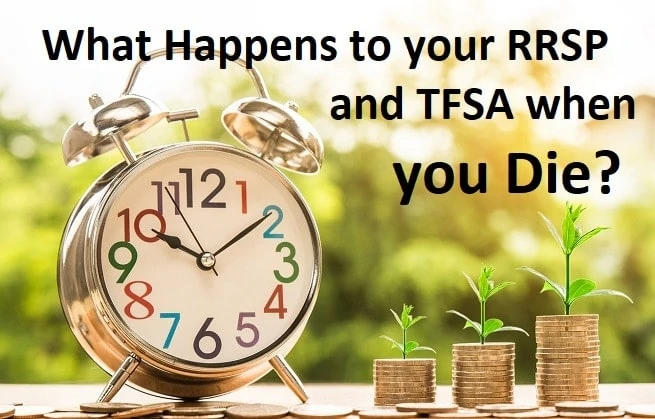What Happens to your RRSP and TFSA after you Die?
Last week, I wrote about the most efficient way to withdraw from your accounts during retirement. Within the article, I mentioned that while the general rule of thumb is to keep your RRSP as long as possible, there are some situations where drawing down on your RRSP first makes the most sense.
This is particularly evident if the RRSP holder passes away early which could result in high taxation on the RRSP balance either immediately (no spouse or financial dependants) or in the future. It’s also interesting to note that a number of financial models conclude that withdrawing from your TFSA should be your last account to touch. Of course, every situation is different, so I will be looking into different scenarios in a future post.
Going through that exercise for my personal situation, it made me self-reflect, and start to think about estate planning. What exactly happens to your RRSP and TFSA after you die? What is the most tax efficient way to pass on your retirement accounts to the next generation or to charity? Let’s take a look!
For folks who are in the process of planning their financial future, we recommend taking a look at Kyle Presvost’s new online course called ‘Worry Free Retire‘. It will help you avoid the many pitfalls and mistakes most Canadians make when planning their financial future, and it now comes with an exclusive MDJ discount + a 100% money back guarantee.
What Happens to an RRSP when you Die?
To start off with the good news, RRSPs can generally “rollover” tax-free to qualified beneficiaries such as:
- a spouse/spousal trust/common-law partner;
- financially dependent children/grandchildren under 18;
- or disabled children/grandchildren of any age.
From a paper trail perspective, the beneficiary will need to report the RRSP assets on their tax return, but the beneficiary will receive a tax deduction to offset the taxes owed. Another benefit of having a qualified beneficiary is that it avoids estate probate tax, which can add up!
Will as a backup! If you have an eligible beneficiary in your life, make sure that your discount brokerage has it on file! As an alternative, a qualified beneficiary named in the RRSP holder’s will and last testament is also eligible for the rollover.
Charity is another option! If you don’t have a tax-free beneficiary as stated above, your estate will pay taxes on the RRSP as if it is liquidated the year that you die (plus probate). One alternative is to choose a charity as the beneficiary which would result in a tax credit that would reduce or eliminate taxes due from the RRSP.
What about an RRIF?
What if the RRSP has been converted to an RRIF? Similar rules to an RRSP, but with one slight difference. A spouse can be named either a “beneficiary” or a “successor annuitant.” Instead of having all the assets liquidated and transferred over to the spouse’s account (beneficiary), a successor annuitant can simply take over the existing RRIF account.
There are a couple of advantages. The first is timing – what if the liquidation happens during a market down cycle? Another advantage is that there is much less paperwork involved with a “successor annuitant” designation. Who wants more paperwork?
What Happens to a TFSA when you Die?
Now that we have the RRSP out of the way, what happens to a TFSA? The beauty of the TFSA is that it is funded with after-tax dollars, which means that there are no withdrawal taxes which carries on even after you pass away.
But even without withdrawal taxes, the estate can face probate taxes if the accounts are not designated properly.
For TFSA’s, you have two options for tax-efficient distribution (ie. no estate probate taxes):
- Successor Holder (Spouse/common-law)
- Beneficiary (spouse/common law/anyone else)
Electing your spouse/common-law partner as a Successor Holder on the account is likely the most efficient way to go. Similar to the “Successor Annuitant” for RRIFs as explained earlier, this will allow the spouse/common-law partner to simply take over the account with very little in terms of paperwork.
A beneficiary will also receive the funds tax-free, but there is a tax payable if the account rises in value from the date of death to the date that the funds are transferred. Still a pretty good deal, it’s just that the beneficiary will need to act fast!
The best solution? As stated on Retire Happy Blog, assign a Successor Holder if you can, but also assign a backup beneficiary. If both you and your spouse pass away at the same time, this would help avoid running the TFSA funds through the estate thus avoiding probate taxes.
Objective Financial Partners: Growing your TFSA
The easiest way to grow your TFSA nest egg? Get a free consultation with a certified financial planner!
How do I set up a Beneficiary/Successor Holder in my RRSP/TFSA?
When you originally signed up for the account, the discount brokerage would have asked for beneficiary information. Any changes can be made by contacting your discount brokerage and they will give you the appropriate forms to fill out. I would suggest to get on the ball and get this completed sooner rather than later.
When I recently checked my accounts (like right before writing this post), my RRSPs were assigned properly, but my TFSA only had a beneficiary and not a Successor Holder. I’m planning on getting those forms completed before the end of this week.
Final Thoughts
If I were to summarize this article, I would say to make sure you have the correct beneficiaries set in all of your registered accounts. If you are not sure, the best bet is to contact your discount brokerage and complete the appropriate forms if you need to make changes.
The biggest thing I learned while doing research for this article was to set a Successor Holder for your TFSA along with a backup beneficiary. This has two advantages. First, it will allow your spouse/common-law partner to take over your account without the added paperwork and potential tax. Second, if both spouses pass away at the same time, assigning a backup beneficiary will ultimately help avoid probate tax, and in our case, make our kids/designated charity a little richer.
I've Completed My Million Dollar Journey. Let Me Guide You Through Yours!
Sign up below to get a copy of our free eBook: Can I Retire Yet?












Hi FT,
For RRIF, can I designate both a successor annuitant (spouse) and a beneficiary (ie. son) at the same time? in case both myself and my wife pass away, my son can receive the funds?
Peter: TFSA is considered closed and assets pass onto beneficiaries. They can only put assets into their TFSA if they have contribution room. Taxes are only owed on any growth after death and not on the balance of the TFSA at time of death.
RRSP/RRIF are deemed sold at time of death and brought into taxable income on the deceased final tax return. If you die with a large RRSP/ RRIF it will get tax whacked. Beneficiary gets what left after taxes paid. Taxes could be huge as noted above.
I think people with pensions should look to draw down RRSP/RRIF before age 71 depending on the structure of the pension. There is a strategy where you withdraw enough RRSP/RRIF money to keep you just below the bottom of the next tax bracket, pay the tax, move that money into TFSA or non registered account if room.
Just some thoughts to investigate. Remember this is internet advice so seek professional guidance. Great question.
What happens to RRSP and TFSA when the second spouse dies? There is no mention of that in your article. I understand there will be significant tax that will need to be paid to the government before the money goes to the next generation (beneficiary).
Can you discuss some strategies that would help to protect the nest egg which would involve paying less taxes? Things such as life insurance, will etc.
Helping out an elderly relative following her husband’s death. RRSPs eligible for transfer are fairly modest ($65k), but she’ll be receiving a significant pension from her husband going forward. As he passed early in the year, we’re running the numbers to see if it makes sense to cash out a portion of the RRSP to be taxed with her husband’s estate vs. full RRSP transfer. Any thoughts on this general scenario?
Hi Dave,
Typically, when pensions transfer from one spouse to another, it is usually not 100% of the pension. How old is your relative? She will not have forced to withdraw from the RRSP/RRIF until age 71. If the RRSP runs through the estate, it will also face probate tax. Without knowing more, I would lean more towards transferring the RRSP rather than letting it run through the estate.
If your spouse is a “U.S. person,” name him or her as beneficiary. Current U.S. tax law does not recognize earnings within TFSAs as tax-free and characterizes them as “foreign trusts,” adding yet another layer of onerous reporting requirements for the survivor.
Great tip Deborah. I didn’t realize that the U.S tax law does not recognize “Successor Holders” for TFSAs.
People need to also consider the income tax implications when setting this stuff up. True story. A man (let’s call him Jack) is 50, divorced, and self employed. Being self employed he stuffs as much money as possible in his RRSP. Jack runs the business with his mom (let’s call her Elaine). Jack also has a child (let’s call him Steve). Jack owns his house as well as some other assets. Let’s assume the total value of all his nonRRSP assets are worth $500,000 and he has $500,000 in his RRSP.
Jack decides to leave the RRSP to Elaine (he will probably outlive her anyway) and leaves everything else to Steve. Seems equal, right? Wrong. Jack drops dead at age 50. Elaine gets the $500,000 RRSP (no withholding). When you die with no one eligible for a rollover, The taxman treats it as a withdrawal so Jack pays tax on the entire amount (which obviously is at the highest tax rate). For simplicity let’s assume 40% is the tax payable on this ($200,000). Who pays the taxman? The estate. Which is everything left to Steve.
So Steve gets the remainder. let’s ignore probate (I wish). Elaine got $500,000. Steve got $300,000. It would nice if Elaine stepped up and paid the tax but she doesn’t. Does The estate have $200,000 to pay the tax bill. So the house (or god forbid the family cottage) needs to be sold or mortgaged to pay it. Jack thought it was evenly divided. Why? Because he didn’t look at the whole picture. Again, true story.
Hi Susan,
This is a really great example, thanks. Do you work in the financial services industry? Can you post some more examples of pitfalls and what to look out for?
No, used to own an accounting practice and did personal and small business taxes.
Thanks for the article. I think, however, that the best piece of advice that you didn’t give was – talk to a lawyer. Estate planning can be tricky and acting on free, non-expert advice from the internet can land you in a world of trouble. For example, if I list my children, who are under the age of 18, as beneficiaries of the TFSA, guess what happens if both my spouse and I die at the same time?
Because I wanted to save a little bit of probate tax and listed them as beneficiaries instead of having the TFSA flow through to my estate, the Public Trustee now holds my TFSA in trust for my children until they turn 18, at which time it will be turned over to them without restrictions. Do you want the Public Trustee to manage your TFSA and then hand over, perhaps a hundred grand, to an 18 year old?
Best thing to do is speak with a lawyer and get a will – and avoid the pitfalls.
That is great advice Robert, thanks for taking the time to leave the comment. Question though, if you were to leave money to children under 18, how would you do it?
Thanks for the mention, FT!
You are welcome – and thank you for the detailed content!